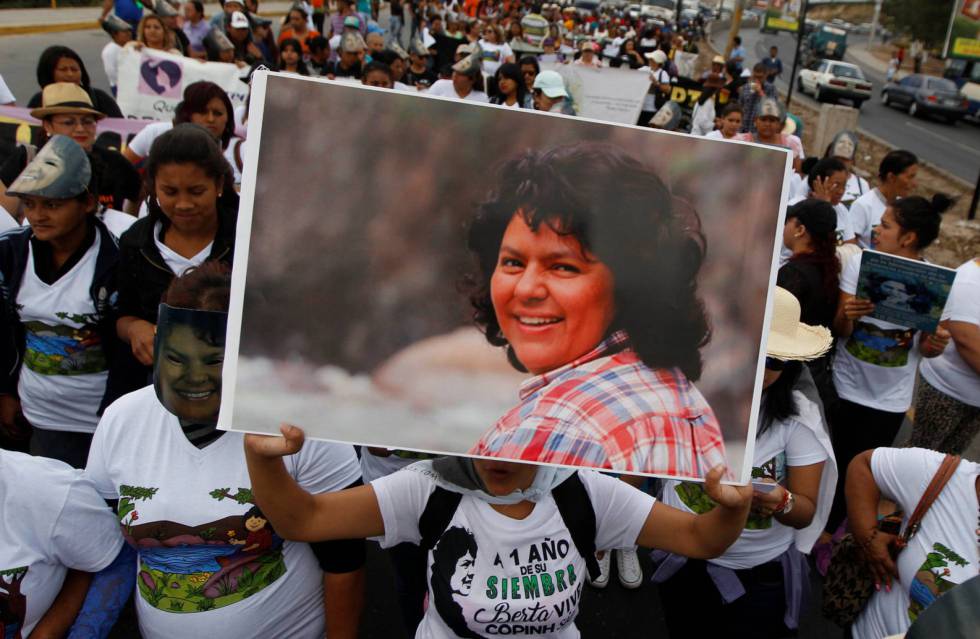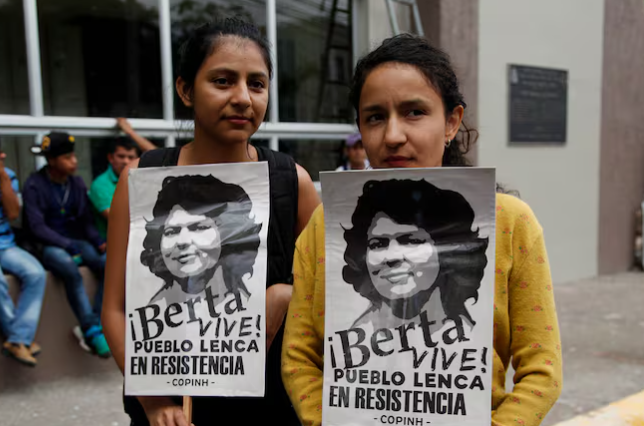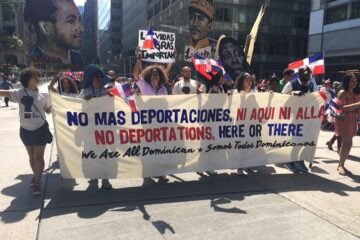Bertha and Laura Zúñiga are members of the Civic Council of Popular and Indigenous Organizations of Honduras (Consejo Cívico de Organizaciones Populares e Indígenas de Honduras—COPINH) and daughters of the environmentalist feminist militant Berta Cáceres, assassinated in 2016. For eight years now, grassroots movements from Honduras have been fighting for justice for Berta. One of the movement’s primary demands since the beginning has been the investigation into the people who ordered her murder. “We strongly demand to expose who are the perpetrators, what is behind my mother’s assassination, what interests they wanted to benefit with her assassination,” Laura explains.
The pressure to have the case investigated has resulted in a trial in 2018 and ultimately, in 2019, eight men were found guilty—seven executors and David Castillo, who operated as a middleman between them and the people who hired them. The eight perpetrators had connections with the company responsible for the hydroelectric project that Berta and COPINH were denouncing—the Agua Zarca project on Gualcarque River. While the court found them guilty, it has not imposed a sentence or held the people who hired them accountable. This is why COPINH continues to pressure for justice.
Bertha and Laura argue that the investigation into their mother’s assassination marks a change in the pattern of investigations into crimes against grassroots leaders and defenders. They say that, in Honduras, 90 percent of the masterminds behind different types of crimes go unpunished. “We consider it a grassroots victory against a system of impunity,” Bertha argues. She says that, “within justice systems, there are pieces that work and operate to persecute social leaders and ensure that economic groups go unpunished. This was a crime in which we were able to identify the participation of structures of contract killers, of military structures, and also a very powerful economic group in Honduras, which is the Atala Zablah family.” The Atala Zablah family is deeply connected to Latin America’s extractivist sectors, and one of their members, Daniel Atala Midence, received an arrest warrant in connection with Berta’s case.
In this interview, granted on June 5th, 2024, Bertha and Laura spoke about the investigation and the guilty verdict. The interview was collectively conducted by more than 20 media outlets and ally grassroots organizations that are part of ALBA Movements in different countries of Latin America and the Caribbean. Read the translated interview below or listen to it in Spanish.


What are the reasons delaying or postponing the pronouncement of the sentences so much?
Laura: It’s been postponed because there are many interests pressuring to not confirm their sentencing. It has to do with the fact that they are trying to delay and boycott the process of serving justice for my mother. We know that, even within the judicial branch, there is this whole discussion about the interferences that are happening by this powerful economic group. Now it is up to us, as grassroots movements, to protect these sentences and their confirmation.
What is the attitude of the Honduran government toward this particular case? Do you think it’s favorable to the cause or does it create more conditions for impunity?
Bertha: Justice for Berta Cáceres was a theme in the presidential campaign of Xiomara Castro, our president. In the executive branch, a specific petition was filed—and we believe there has been some progress there. There is a very important element here: the matter of justice of Berta still depends almost entirely on the judicial branch. The executive branch cannot formally intervene in these decisions. So far, and very specifically regarding the resolution of these sentences, the Supreme Court of Justice has not issued any public statements. So I think it’s very important that the organizations that are part of ALBA Movements can hold actions aiming to make sure that the government means what it says and takes action for the good of the justice process.
What continental political and legal strategies can be useful in this phase we are now?
Laura: We have resorted to the Inter-American Commission on Human Rights about the protection measures my mother had, and that COPINH and the victims in this case have. One of the things we are trying is to expose at an international level is the negligence and the decision to fail to provide the care Berta Cáceres needed. It’s also important to be well-informed and little by little disrupt the media siege perpetrated by hegemonic media outlets, because this case also symbolizes the case of many other women who defended their territories and challenged the patriarchal and racist capitalist system.
Bertha: At COPINH, we have defined some important actions, like sending letters to the Supreme Court of Justice. It doesn’t have to be by people, organizations, or institutions dedicated to the legal world—it can be general organizations and letters that can be delivered directly to the Criminal Chamber of the Supreme Court of Justice. Any public action that shows concern is good, even actions by the Honduran government, as this was a topic discussed during the campaign.
We believe it is very important that this should follow COPINH’s organization process and render other victims that are not directly connected to this case visible, like Indigenous peoples, assassinated women, and defenders. In isolation, it doesn’t make a lot of sense if there is no legal impact strengthening our own organizational capacities and reinforcing the messages of our sister Berta Cáceres for Honduras, for what we want to change, for the region at a continental level.
Do you think there have been advances in the courts’ approach from a gender perspective since the case has been brought?
Laura: I believe it has been a battle for COPINH to be able to address and show, within justice institutions, how an Indigenous woman is assaulted. The gender issue and the issue of racialized bodies has been addressed and I believe there has been some progress, because it was a struggle where they included experts that investigate how the fabric of Indigenous communities has been historically disrupted and how communities have been targeted by specifically attacking a woman, which is very different from the way men are attacked.
In this sense, I believe that the trial was also a moment to teach the Honduran justice system how to approach Indigenous women who are defenders and fighters. The hegemonic media tries to undermine our voices and that also has to do with undermining diversity. They not only tried to say it was nothing but a homicide, but also say it was a “skirt crime,” which is a nefarious name for femicide and also a way to remove the homicide element from a case of a defender who faced many other threats and attacks.
What is the current situation of the environmental struggle in Honduras and what are the main challenges the environmental movement is facing right now?
Bertha: Unfortunately, Honduras remains one of the most dangerous countries when it comes to defending Mother Earth, common goods, land, and territory. We have very sensitive cases in our country, like those in Lower Aguán in the northern coastal area, where many social leaders have been killed with impunity. We always talk about the coordination of economic groups in our country. While this is an emblematic case that has disrupted the norm of how things have been happening in our country, it’s important that it can somehow contribute to clarify the situation of other people who are assassinated, which continues to happen in Honduras.
While there is a will to change, these criminal structures remain untouched. We continue to try to make the connection between the financial and economic issue of corruption and this kind of case, because it is very obvious. The assassination of women, the trafficking networks, and femicide cases remain constant issues, because the justice issue is a challenge. We ultimately got to know a little bit more about the justice system from within. It is really something that—to put it plainly—gives you chills, drives you crazy. There are so many political and economic interests of all sorts.
Laura: Regarding our challenges, I would say impunity is a big one. It’s hard to continue to fight amid so much impunity and so many crimes. It’s also a struggle to really pursue the recognition of the victims and organizations’ rights. Historically, we did it in a trial—the trial for corruption and fraud involving Gualcarque—in which COPINH and the Indigenous council of the Rio Blanco community were formally considered victims. That had never happened before in our country.
Also, of course, we must pursue the full recognition of the rights of Indigenous communities. The environmental issue has been sometimes considered or discussed in abstract terms, as if there were no communities where there is the environment and, therefore, there are no rights. We reiterate: we protect 85 percent of our country’s reservation and forest areas. Environmental measures cannot be taken by disregarding our rights as communities. The laws do not consider us managers of protected areas. A final challenge is to find real solutions. Today, capitalism itself has offered so many false environmental solutions that have convinced even people in the government. There is a great battle we have to wage to find real solutions for a climate and environmental crisis that has meant the systematic violation of rights of subjects whose responsibility is to protect this nature and these common goods.
Laura: The struggle for justice for Berta is immersed in the struggle for justice for the Lenca people. In this sense, we continue to battle so that Gualcarque River can run free, because it is currently under a concession, and corruption is an integral part of the river concession process. As people have been found guilty, we are witnessing how extractivism operates in Honduras and how this concession was also operating illegally. The Lenca communities organized in COPINH continue to demand rights that have been historically denied to them. The organization remains active.




